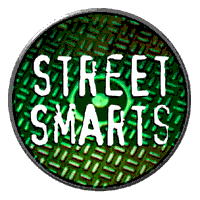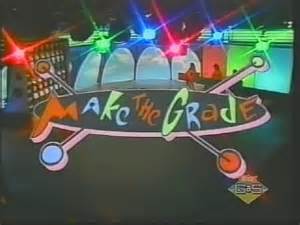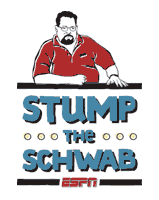Related Research Articles

The Weakest Link is a British television quiz show, mainly broadcast on BBC Two and BBC One. It was devised by Fintan Coyle and Cathy Dunning and developed for television by the BBC Entertainment Department. The game begins with a team of nine contestants, who take turns answering general knowledge questions within a time limit to create chains of nine correct answers in a row. At the end of each round, the players then vote one contestant, "the weakest link", out of the game. After two players are left, they play in a head-to-head penalty shootout format, with five questions asked to each contestant in turn, to determine the winner.
Remote Control is an American TV game show that ran on MTV for five seasons from 1987 until 1990. It was MTV's first original non-musical program and first game show. A concurrent syndicated version of the series ran during the 1989-90 season and was distributed by Viacom. Three contestants answered trivia questions on movies, music, and television, many of which were presented in skit format.

Beat the Geeks is an American television game show that aired on Comedy Central from 2001 to 2002. The show was rerun on The Comedy Network in Canada.

Street Smarts is an American game show that featured two in-studio contestants trying to predict the outcome of interviews of people who were found on the street. The show, which was hosted by Frank Nicotero, aired in syndication from 2000 to 2005. Nicotero would be on locale with the on the street contestants, virtually any and everywhere in the United States. The in studio gameplay however, was at G4 and TMZ, headquarters, Victory Studios, in Glendale, California.

Make the Grade is a children's game show that aired from October 2, 1989, to September 14, 1990, on Nickelodeon.

Get the Picture is a children's game show that aired from March 18, 1991 to December 6, 1991, with repeats until March 13, 1993 on Nickelodeon. Hosted by Mike O'Malley, the show featured two teams answering questions and playing games for the opportunity to guess a hidden picture on a giant screen made up of 16 smaller screens. The show was recorded at Nickelodeon Studios in Universal Studios, Orlando, Florida. The program's theme music and game music was composed by Dan Vitco and Mark Schultz, and produced by Schultz. Its tagline is The Great Frame Game.

Stump the Schwab is an American game show that aired on ESPN2 and ESPN Classic from July 8, 2004 to September 29, 2006. The show featured three contestants trying to defeat Howie Schwab, ESPN's first statistician, in a sports trivia contest. Stuart Scott was the show's host. The show also appeared on Canada's The Score Television Network.

Split Second is an American game show that was created by Monty Hall and Stefan Hatos and produced by their production company, Stefan Hatos-Monty Hall Productions.
Trivial Pursuit is an American game show that ran on The Family Channel from June 7, 1993, to December 30, 1994. Loosely based on the board game of the same name, it was hosted by Wink Martindale with Randy West announcing.

Miljoenenjacht, officially Postcode Loterij Miljoenenjacht, is a Dutch game show, sponsored by the country's postcode lottery, where a contestant and at-home viewer could win up to €5,000,000 or as little as €0.01. The show is broadcast at various times, spanning across six episodes for each set. The program was originally shown by TROS on NPO 2, but moved to creator John de Mol's channel Tien in 2005. After the channel was discontinued after its sale to the RTL Group, the program moved to RTL 4. In 2019, the program moved to SBS6 due to the transfer of Linda de Mol from RTL to SBS.

1 vs. 100 was an Australian game show based on the American version of the same name and the original Dutch version created by Endemol. The game pits one person against 100 others for a chance to win one million dollars. The program was hosted by former Nine Network CEO and personality Eddie McGuire.

Grand Slam is an American game show based on the British series of the same name. Unlike the British series, which was played as a regular quiz show, the American version was conducted as a super-tournament featuring contestants who had appeared on other game shows.
Game On! is a Canadian sports trivia television game show that was a variation on Jeopardy!. It ran from 1998 to 2000 on Global and was shown on GameTV. The show was hosted by Tim Steeves in season 1 and David Merry in Season 2, with Jennifer Hill as the female co-host. Three male contestants compete in this game. The set was designed to resemble a sports enthusiast's wood-paneled basement recreation room decorated with posters, trophies and other sports memorabilia. The host stood behind a 1970s-style wet bar while the three contestants sat in leather lounge chairs. To answer a question, a contestant pressed a button on a device that resembled a TV remote control.

BrainRush is a live-action game show on Cartoon Network, hosted by Lamorne Morris and, to a lesser extent, Sarah Karges. It first aired on June 20, 2009, with its last episode airing on July 22, ending after one season.

Let's Ask America is an American interactive game show which debuted on September 17, 2012. The show features contestants who play from their homes via webcams, answering trivia questions relating to current events. On November 4, 2013, it was announced that Scripps planned to launch Let's Ask America nationwide through a distribution deal with MGM Television. Contestants participate by Skype from the comfort of their own home, an inexpensive technology negating the need for travel expenses. In sweeps months, the show features celebrity editions featuring local news talent from the stations carrying the series such as meteorologists and anchors playing the game from their station's studios for local charities.
L'eredità is an Italian Rai 1 game show currently hosted by Marco Liorni. It premiered on 29 July 2002. From 29 July 2002 to 10 June 2006, it was hosted by Italian presenter Amadeus. He was succeeded by Carlo Conti, who hosted the show until 14 April 2014, when he was replaced by Fabrizio Frizzi. Frizzi hosted until 23 October 2017, when he became ill during the taping of the next show and was taken to the hospital. Carlo Conti substituted for Frizzi from 30 October 2017 to 15 December 2017, and he hosted the special episode in tandem with Fabrizio Frizzi when the latter returned to host the quiz. On 16 December 2017, Fabrizio Frizzi resumed hosting the show by himself until 25 March 2018. The next day, Frizzi died of a brain haemorrhage. Following a hiatus due to Frizzi's death, the game returned from 3 April 2018 until the end of the season with the host Carlo Conti. Flavio Insinna presented the show from 24 September 2018 until 2023.

Ask Me Another is an hour-long radio puzzle game show that was produced by WNYC and National Public Radio. It was hosted by Canadian American comedian Ophira Eisenberg and featured as its "in-house musician" or "one-man house band" independent rock musician Jonathan Coulton. Episodes of the show were usually recorded at The Bell House in Brooklyn, New York, however the show did go to various states across the country and recorded one or more episodes from those locations. The show was produced by WNYC Studios. During the COVID-19 pandemic in the United States, the show continued taping episodes from the homes of the participants, without a studio audience.
Weakest Link is a television game show which first appeared in the United Kingdom on BBC Two on 14 August 2000 and originally ended on 31 March 2012 when its host Anne Robinson completed her contract. The original British version of the show is still aired around the world on BBC Entertainment and domestically on Challenge. The game begins with a team of eight or nine contestants who take turns answering general knowledge questions within a time limit to create chains of correct answers in a row. At the end of each round, the players vote one contestant, "The Weakest Link", out of the game. Once two players are left, they play in a head-to-head contest, with five questions asked to each contestant in turn, to determine the winner.

Game of Games is an Australian TV game show hosted by Grant Denyer based on the American game show Ellen's Game of Games. It premiered on Network Ten on Sunday, 7 October 2018 at 7:30pm and on 24 November 2018 Channel Ten changed its timeslot to 7:00pm every Saturday. The first season concluded on 15 December 2018.

Master Minds is an American game show airing on the Game Show Network. The show debuted on June 10, 2019, under the title Best Ever Trivia Show, hosted by Sherri Shepherd and regularly featuring Ken Jennings, Muffy Marracco, Jonathan Corbblah, Arianna Haut, and Ryan Chaffee. The series was renamed Master Minds on April 6, 2020, with Brooke Burns replacing Shepherd.
References
- ↑ Kiernan, Pat (July 22, 2004). "Morning to Night". Newsday. Retrieved 16 May 2022.
- ↑ Bauder, David (July 21, 2004). "Twisted Quizzes". The Fresno Bee. Retrieved 16 May 2022.